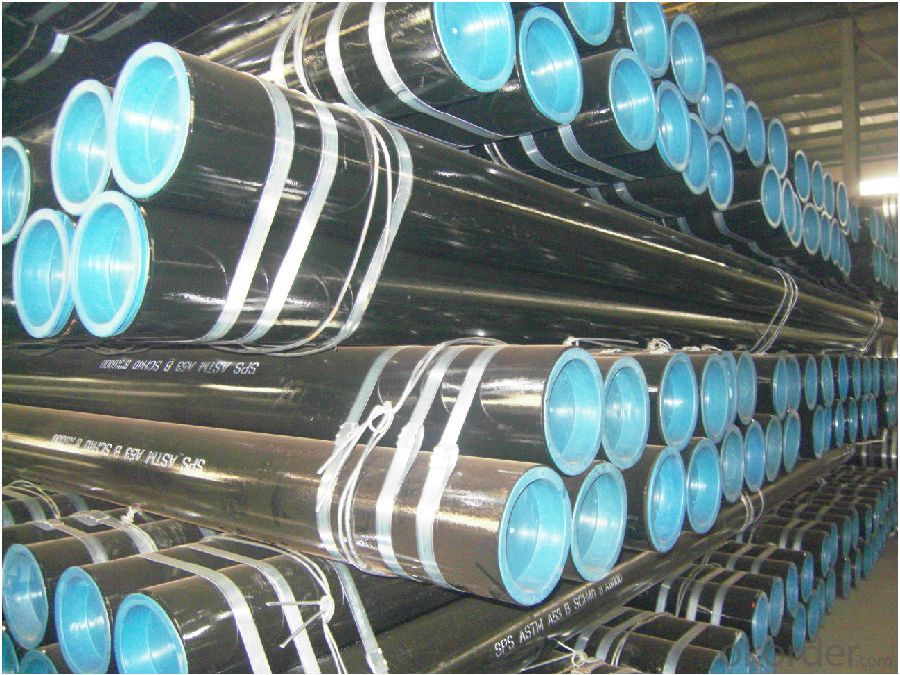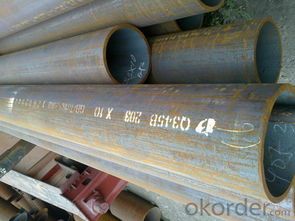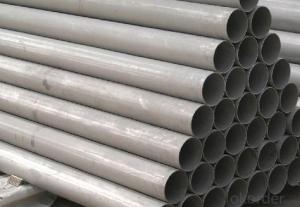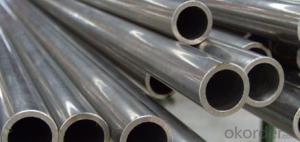Carbon Steel Seamless Pipe for Line Pipe PSAL 1 for Structure
- Loading Port:
- Tianjin
- Payment Terms:
- TT OR LC
- Min Order Qty:
- 25 m.t.
- Supply Capability:
- 10000 m.t./month
OKorder Service Pledge
OKorder Financial Service
You Might Also Like
Product Description:
1、Carbon Steel Seamless Pipe for Line Pipe PSAL 1 for Structure Description:
Seamless steel pipe is formed by drawing a solid billet over a piercing rod to create the hollow shell. As the manufacturing process does not include any welding, seamless pipes are perceived to be stronger and more reliable. Historically seamless pipe was regarded as withstanding pressure better than other types, and was often more easily available than welded pipe.
2、Main Features of Carbon Steel Seamless Pipe for Line Pipe PSAL 1 for Structure:
• High manufacturing accuracy
• High strength
• Small inertia resistance
• Strong heat dissipation ability
• Good visual effect
• Reasonable price
3、Carbon Steel Seamless Pipe for Line Pipe PSAL 1 for Structure Images:


Packaging & Delivery
Packaging Details: | seaworthy package,bundles wrapped with strong steel strip |
Delivery Detail: | 15-30days after received 30%TT |
4、Carbon Steel Seamless Pipe for Line Pipe PSAL 1 for Structure Specification:
Standard | GB, DIN, ASTM |
Grade | 10#-45#, 16Mn |
Thickness | 8 - 33 mm |
Section Shape | Round |
Outer Diameter | 133 - 219 mm |
Place of Origin | Shandong, China (Mainland) |
Secondary Or Not | Non-secondary |
Application | Hydraulic Pipe |
Technique | Cold Drawn |
Certification | API |
Surface Treatment | factory state or painted black |
Special Pipe | API Pipe |
Alloy Or Not | Non-alloy |
Length | 5-12M |
Outer Diameter | 21.3-610mm |
Grade | 20#, 45#, Q345, API J55, API K55, API L80, API N80, API P110, A53B |
Standard | ASME, ASTM |
1.Material:20#(ASTM A 106/A53 GRB.API5LGRB,GB),45#,16Mn,10#.
2.Specification range:OD:21.3-610mm,WT:6-70mm,length:6-12m or according to the requirement of clients.
3.Excutive standards:GB,ASME API5L.ASTM A 106/A53,Despite of the above standards,we can also supply seamless steel pipe with standard of DIN,JIS,and so on,and also develop new products according to the requirements of our clients!
4.Surface:black lacquered,varnish coating or galvanized.
5.Ends:Beveled or square cut,plastic capped,painted.
6.Packing:bundles wrapped with strong steel strip,seaworthy packing.
5、FAQ of Carbon Steel Seamless Pipe for Line Pipe PSAL 1 for Structure :
①How is the quality of your products?
Our products are manufactured strictly according to national and internaional standard, and we take a test
on every pipe before delivered out. If you want see our quality certifications and all kinds of testing report, please just ask us for it.
Guaranteed: If products’ quality don’t accord to discription as we give or the promise before you place order, we promise 100% refund.
②How about price?
Yes, we are factory and be able to give you lowest price below market one, and we have a policy that “ for saving time and absolutely honest business attitude, we quote as lowest as possible for any customer, and discount can be given according to quantity”,if you like bargain and factory price is not low enough as you think, just don’t waste your time.Please trust the quotation we would give you, it is professional one.
③Why should you chose us?
Chose happens because of quality, then price, We can give you both.Additionally, we can also offer professional products inquiry, products knowledge train(for agents), smooth goods delivery, exellent customer solution proposals.Our service formula: good quality+good price+good service=customer’s trust
SGS test is available, customer inspection before shipping is welcome, third party inspection is no problem.
Any question, pls feel free to contact us !
- Q:How are steel pipes used in the construction of dams and water reservoirs?
- Steel pipes find widespread application in the construction of dams and water reservoirs owing to their remarkable durability, strength, and capacity to endure heavy loads and high pressure. These pipes serve multiple indispensable functions within the realm of dam and reservoir construction. A primary utility of steel pipes in these structures lies in their capacity to transport water. They are employed to convey water from its source, such as a river or stream, to the reservoir or dam. These pipes are engineered to withstand the elevated water pressure, ensuring a consistent flow of water to the reservoir. The durability of steel pipes enables them to remain intact even in the harshest environmental conditions. In addition to water conveyance, steel pipes are also utilized for drainage purposes. They are employed to establish drainage systems that help regulate the water level within the reservoir or dam. These pipes are strategically positioned to control the water flow and prevent potential flooding or overflow. Steel pipes are also integrated into the construction of spillways and outlets in dams and reservoirs. Spillways are designed to release excess water from the reservoir during heavy rainfall or when the water level exceeds predetermined thresholds. Steel pipes are employed in crafting these spillways to provide a controlled pathway for water discharge, thus averting any harm to the dam or surrounding areas. Moreover, steel pipes are employed in the construction of penstocks, which are large conduits that transport water from the reservoir to turbines in hydropower plants. The pressure generated by the water within these pipes propels the turbines, facilitating electricity generation. The robustness and durability of steel pipes are vital in ensuring the smooth and efficient operation of hydropower plants. All in all, steel pipes occupy an indispensable role in the construction of dams and water reservoirs. Their durability, strength, and ability to withstand high pressure render them an ideal choice for various aspects of these structures, including water transportation, drainage systems, spillways, and penstocks.
- Q:How are steel pipes used in the construction of underground utilities?
- Steel pipes are commonly used in the construction of underground utilities due to their durability and strength. They are used to transport various substances such as water, gas, and sewage underground, ensuring efficient and reliable distribution. Steel pipes are resistant to corrosion and can withstand high pressure, making them ideal for underground applications where they need to withstand the weight of the soil and other environmental factors. Additionally, steel pipes are easy to install and maintain, making them a cost-effective choice for underground utility construction projects.
- Q:What are the quality control measures for steel pipe production?
- Quality control measures for steel pipe production typically include the inspection of raw materials, monitoring of manufacturing processes, and testing of finished products. These measures ensure that the steel pipes meet the required specifications and standards. Additionally, quality control may involve conducting visual inspections, dimensional checks, non-destructive testing, and mechanical testing to ensure the strength, durability, and overall quality of the pipes.
- Q:How are steel pipes used in the chemical processing industry?
- Steel pipes are commonly used in the chemical processing industry for various purposes such as transporting chemicals, gases, and liquids, as well as for structural support and containment. They are highly durable, corrosion-resistant, and can withstand high temperatures and pressures, making them ideal for handling and conveying hazardous substances safely.
- Q:What's the difference between round and round tubes?
- Round steel is solid and round tubes are hollow
- Q:What kind of argon arc welding wire is used for 16Mn steel pipe?
- 16Mn steel belongs to carbon manganese steel, the content of carbon is about 0.16%, and the yield point is equal to 343MPa (strength grade is 343MPa). 16Mn steel alloy content is less, good weldability, welding generally without preheating. But because the 16Mn steel hardened tendency is slightly larger than the low carbon steel, so at low temperatures (such as winter outdoor operations) or welding in high rigidity, large thickness of the structure, in order to prevent the cold crack, need to take measures to preheat.
- Q:What are the factors to consider when selecting a steel pipe for a specific application?
- When selecting a steel pipe for a specific application, several factors need to be considered. These include the type of fluid or gas being transported, the pressure and temperature conditions, the size and dimensions required, the desired corrosion resistance, and the overall budget for the project. It is also crucial to assess the pipe's material properties, such as its strength, ductility, and toughness, to ensure it can withstand the operational demands of the application. Additionally, factors like the pipe's manufacturing process, compatibility with joining methods, and any specific industry standards or regulations should be taken into account.
- Q:What are the advantages of using steel pipes in industrial plants?
- There are several advantages of using steel pipes in industrial plants. Firstly, steel pipes are known for their exceptional strength and durability. They can withstand high temperatures, pressure, and heavy loads, making them ideal for transporting various materials and fluids within industrial facilities. Secondly, steel pipes have excellent resistance to corrosion. This is particularly important in industrial settings where the pipes come into contact with corrosive substances or are exposed to harsh environmental conditions. The corrosion resistance of steel pipes ensures their longevity and helps to prevent leaks, which can be costly and hazardous. Additionally, steel pipes offer a high level of versatility. They can be easily fabricated and customized to meet specific requirements, such as different sizes and shapes. This flexibility allows for easier installation and maintenance, reducing downtime and improving overall efficiency in industrial plants. Moreover, steel pipes have a smooth interior surface, which offers several advantages. It allows for efficient flow of materials, minimizing resistance and pressure drop. This smoothness also makes steel pipes less prone to accumulating deposits and contaminants, ensuring a clean and hygienic environment. Furthermore, steel pipes are highly resistant to fire. In industrial plants, where fires can have catastrophic consequences, the fire resistance of steel pipes provides an added layer of safety. Lastly, steel pipes are cost-effective in the long run. Although their initial installation cost may be higher compared to other materials, such as plastic or copper, their durability and low maintenance requirements result in significant cost savings over time. Steel pipes have a long lifespan, reducing the need for frequent replacements or repairs, and their resistance to corrosion and other damages also contributes to cost reduction. In conclusion, the advantages of using steel pipes in industrial plants include their strength, durability, corrosion resistance, versatility, efficient flow, fire resistance, and cost-effectiveness. These qualities make steel pipes a reliable and efficient choice for various applications within industrial facilities.
- Q:What are the common sizes of steel pipe fittings?
- The common sizes of steel pipe fittings can vary depending on the specific application and industry standards. However, there are several standard sizes that are commonly used across different industries. These sizes range from ¼ inch to 48 inches in diameter. Some of the most common sizes include ½ inch, ¾ inch, 1 inch, 1 ¼ inch, 1 ½ inch, 2 inch, 2 ½ inch, 3 inch, 4 inch, 6 inch, 8 inch, 10 inch, 12 inch, 14 inch, 16 inch, 18 inch, 20 inch, 24 inch, 30 inch, 36 inch, 42 inch, and 48 inch. These sizes are often available in various lengths to accommodate different installation requirements. It is important to consult industry standards and specifications to determine the appropriate size of steel pipe fittings for a specific project.
- Q:How are steel pipes insulated to prevent heat loss?
- Steel pipes are typically insulated using materials such as fiberglass, foam, or mineral wool. These insulation materials are wrapped around the pipes and securely held in place with tapes or clamps. This insulation layer acts as a barrier, reducing heat transfer and preventing heat loss from the steel pipes.
1. Manufacturer Overview |
|
|---|---|
| Location | |
| Year Established | |
| Annual Output Value | |
| Main Markets | |
| Company Certifications | |
2. Manufacturer Certificates |
|
|---|---|
| a) Certification Name | |
| Range | |
| Reference | |
| Validity Period | |
3. Manufacturer Capability |
|
|---|---|
| a)Trade Capacity | |
| Nearest Port | |
| Export Percentage | |
| No.of Employees in Trade Department | |
| Language Spoken: | |
| b)Factory Information | |
| Factory Size: | |
| No. of Production Lines | |
| Contract Manufacturing | |
| Product Price Range | |
Send your message to us
Carbon Steel Seamless Pipe for Line Pipe PSAL 1 for Structure
- Loading Port:
- Tianjin
- Payment Terms:
- TT OR LC
- Min Order Qty:
- 25 m.t.
- Supply Capability:
- 10000 m.t./month
OKorder Service Pledge
OKorder Financial Service
Similar products
New products
Hot products
Related keywords






























